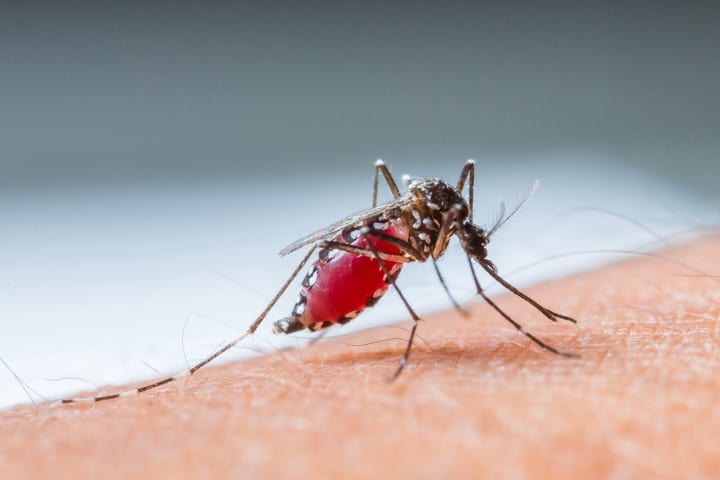
For the first time in 20 years, authorities have identified locally acquired malaria cases in the United States.
The U.S. Centers for Disease Control and Prevention (CDC) announced last week that four Floridians and one person in Texas are being treated for the mosquito-borne illness. They say that the Texas case is not related to those in Florida.
Malaria is a serious, potentially fatal disease that the CDC says should be treated as a medical emergency. However, it had been considered eliminated from the United States since 1951, thanks to the mosquito repellent known as DDT.
The Excellent Powder
U.S. home-spraying operations had commenced just four years earlier, in 1947, when there were 15,000 cases of malaria in the Southeast alone. Only four years later, the disease was almost unheard of. It’s now such a distant memory that people have lost their fear of it and forgotten the danger.
Malaria could be eradicated worldwide by now if not for the global ban of DDT in the 1970s. That came after a vicious, unsubstantiated smear campaign in the 1960s by radical environmentalists. They spread lies about DDT thinning bird eggshells, killing humans, and causing cancer.
Though all allegations against DDT have been proven wrong, the United Nations Environment Program still classifies the pesticide as one of 12 “Persistent Organic Pollutants,” effectively banning it in most countries.
Disastrous Results
As a result, hundreds of thousands of people perish each year. CDC estimated 241 million cases worldwide in 2020, and 627,000 deaths. Most of the latter are children in sub-Saharan Africa.
The agency also estimates around 2,000 malaria cases in the U.S. annually, but it credits international travelers who bring it back with them. That is what makes the latest CDC announcement troubling — the cases in Florida and Texas are locally acquired.
Could this be karma playing out? Dr. Donald Roberts and Richard Tren wrote in their 2010 exposé The Excellent Powder: DDT’s Political and Scientific History: “European nations and the United States used insecticides to rid themselves of disease and then pulled up the ladder, denying Africans, Asians and Latin Americans the benefits of those same insecticides.”
The ban ensures the spread of not only malaria, but also other insect-borne diseases such as typhus, yellow fever, and dengue fever. Even the 2016 Zika outbreak, which officials linked to thousands of debilitating birth defects in Latin America, was not enough to break the stubborn allegiance to DDT’s unscientific prohibition.
Writing for National Review, Robert Zubrin opined: “So long as Zika remains mostly limited to its current tropical haunts, the heartless hypocrites will doubtless maintain that while they, too, are deeply troubled by seeing babies born with missing brain parts, concerns over eggshell thickness must take priority.”
Motive: Vaccines & GMOs
Perhaps firm adherence to the DDT ban could relate to the malaria vaccine that WHO approved in 2021. Known as RTS,S or Mosquirix, it is manufactured by drugmaker GlaxoSmithKline, and the Bill & Melinda Gates Foundation funded its development. It has an efficacy rate of only 30 to 40 percent.
The R21/Matrix-M malaria vaccine is another, more recent release. Regulators in Ghana approved it this past April for children as young as 5 months. Another Gates Foundation grantee, Novavax, helped to develop that drug.
The Gates Foundation also funds British biotech company Oxitec, which released its first genetically modified mosquitoes in the Florida Keys in 2021. The GMO insects are said to pass a lethal gene on to their offspring. Oxitec claims its morphed mosquitoes have slashed populations in test areas, but researchers at the University Network of Environment and Health in Brazil reported their field tests showed only 15 percent efficacy.
AP fact-checkers were quick to jump on social media posts blaming Bill Gates for the recent malaria cases in Florida. Referring to various bug breeds, the report says, “The modified mosquitoes being released are not the kinds that transmit malaria.” Moreover, the Oxitec insects are all male, while only females feed on human blood.
However, the Brazilian scientists also expressed concern that — with only 15 percent efficacy — releasing millions of genetically modified male mosquitoes into the population increases the number of fertilized females spreading diseases. They also pointed out that genetic modifications could lead to unexpected results such as pesticide resistance or newfound ability of the vectors to spread other diseases.
And while Oxitec’s Florida trials may involve the Aedes aegypti mosquitoes — which transmit plagues such as the Zika virus and yellow fever — Bill Gates has been funding GMO research on Anopheles mosquitoes for years.
Those are the sort that spread malaria. Gates’ morphed Anopheles are part of his Target Malaria initiative, a university consortium that began in 2005. According to NPR, scientists use CRISPR technology — made famous from gain-of-function Covid research — to gene-edit the bugs to make them sterile.
Late last year NPR reported on a University of Washington trial that used mosquitoes to transmit a malaria vaccine, which researchers hope will be substantially more effective than Mosquirix. The lead scientist, Dr. Sean Murphy, told NPR, “We use the mosquitoes like they’re 1,000 small flying syringes.”
The report explains: “The insects deliver live malaria-causing Plasmodium parasites that have been genetically modified to not get people sick. The body still makes antibodies against the weakened parasite so it’s prepared to fight the real thing.”
Why isn’t anyone pointing out that DDT is more effective, completely safe, and inexpensive to manufacture?



















































